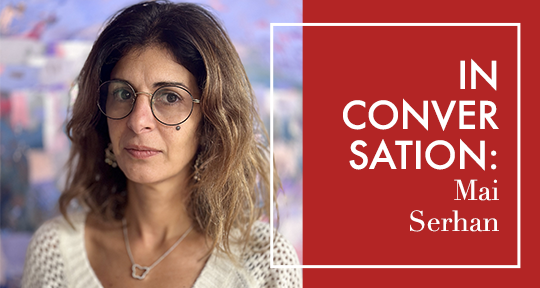Short story writer, poet, memoirist, and translator Mai Serhan was born to a Palestinian father and an Egyptian mother, and raised between the United Arab Emirates and Egypt. Going on to study between Cairo, New York, and Oxford and work in Cairo, Dubai, and China, this mapping of her personal cartography and her transnational lineage transcends the borders of postcolonial nation-states—and so does her forthcoming memoir, Return is a Thing of Amber, which touches among national histories, letters, and the personal essay.
In this interview, I asked Serhan about her book in the landscape of the larger Arab memoir from the diaspora; the languages and genders that thrive in the liminalities of modern Egyptian literature; state censorship in publishing and the consequent rise of the literary blog; and translating the songs of Egyptian composer Sayyed Darwish as well as the letters of Palestinian activist Ali Shaath.
Alton Melvar M Dapanas (AMMD): The language of contemporary Egyptian literature, de facto, is Modern Standard Arabic—but there are writers who write in colloquial Egyptian Arabic and Ṣaʽīdi Arabic, echoing the lived reality of Egyptians in a gamut of dialects. Can you tell us the lingual milieu you write from—and how your decision to write in English come in?
Mai Serhan (MS): Let me first map my geo-genealogical gamut. I was born to a Palestinian father and Egyptian mother, and carried a Lebanese passport for most of my life, since it is where my father’s family moved after 1948, and Egyptian mothers did not have the right to pass their nationality down to their children until 2009. When the Lebanese Civil War broke in 1975, my paternal grandparents moved to Cyprus where they waited for the war to end for fourteen years. It is there that I spent all my summers and Christmases as a child and teenager. The rest of my Palestinian family would fly into Limassol from all corners of the world—Qatar, Saudi Arabia, Kuwait, Jordan, the UK, and the US—and I spent all my formative years exposed to these different registers around me. After university, I joined my father in China where he worked in the export business, and I got to help him until the final year of his life. We travelled far and wide there, meeting with many of his Arab clients. After his death, I moved to Lebanon briefly, then Dubai where I worked as an English copywriter, then to New York where I studied screenwriting at New York University, eventually ending up in Oxford for my Creative Writing degree. All these places have deeply informed my upbringing—which is quite an international one.
I write in English because I went to a private British school, then to American and British universities. It’s the language I have been formally trained in all my life, both academically and professionally. I know how to express myself very well in Arabic, but the written word is definitely more present to me in English; it’s the language that has housed my scholarly and creative pursuits the most. That said, I am able to slip between Arabic and English with total ease and I am the bicultural product of both the East and West—and pretty much everything in between as well.
If we were to speak of my memoir, Return is a Thing of Amber, specifically, I would say the choice to write in English was a political one first and foremost; I wanted to address the English-speaking world, to debunk its many myths about land and people, and to promote awareness, compassion and understanding when it comes to Palestine and Palestinians. READ MORE…

